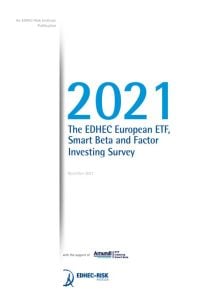

The EDHEC European ETF, Smart Beta and Factor Investing Survey 2021
The latest edition of the EDHEC European ETF, Smart Beta and Factor Investing Survey was conducted as part of the "ETF, Indexing and Smart Beta Investment Strat ...
Author(s):
Summary:
The latest edition of the EDHEC European ETF, Smart Beta and Factor Investing Survey was conducted as part of the "ETF, Indexing and Smart Beta Investment Strategies" research chair at EDHEC-Risk Institute, in partnership with Amundi. With this survey, we aim to provide insights into investor perceptions of exchange-traded funds (ETFs) and of smart beta and factor investing strategies, with a strong focus on investor interest in SRI (Socially Responsible Investing)/ESG (Environmental, Social, Governance), building on the analysis of this year’s responses and relating them to past results of our annual survey.
In a nutshell, the 2021 survey results show a slowdown in the use of smart beta and factor investing strategies, and a growing interest for the integration of an SRI/ESG component into investment.
- The data shows an increase in the use of ETFs to invest in SRI/ESG (67% of respondents in 2021, versus 55% in 2020).
- Achieving broad market exposure still tops the list of reasons for using ETFs, with 74% of respondents using them frequently for this purpose.
- Cost and quality of replication remain the two primary drivers for selecting ETF providers.
- 60% of respondents would like to see further developments in SRI/ ESG-based ETFs and/or low-carbon ETFs, compared to 50% in 2020.
- In terms of sustainable investing, the survey reveals that 51% of respondents invest in SRI/ESG and another 33% plan to do so in the near future.
- Respondents mainly use ESG in the equity (82%) and fixed-income (57%) asset classes.
- 64% of respondents incorporate ESG into their investment decisions to facilitate a positive impact on society, and 61% to reduce long-term risk.
- However, the majority (65%) do not want this to be done at the expense of weaker performance.
- More respondents (44%) favour a best-in-class (positive screening) approach to SRI/ESG implementation over the thematic approach (34%) and the negative screening approach (22%).
- 80% of respondents plan to increase their portfolio exposure to ESG in the near future, and 78% believe that improvements in ESG regulation across Europe will enable them to make better ESG allocations.
- The survey further reveals that improving performance and managing risk are the two main motivations for using smart beta and factor investing strategies.
- However, 73% of respondents dedicate less than 20% of their total investments to these strategies, and only 37% plan an increase of more than 10% in terms of assets in their use of smart beta and factor investing products in the near future.
- SRI/ESG and fixed income are the main expectations for future development of smart beta and factor investing products.
- Survey participants would also like more customised smart beta and factor investing solutions to be developed.
Register to download PDF
Register/Log in| Type : | EDHEC Publication |
|---|---|
| Date : | 15/11/2021 |

